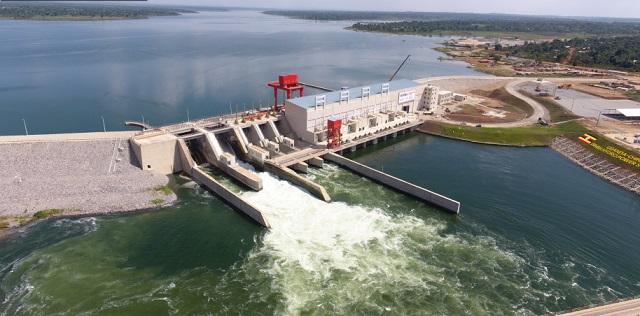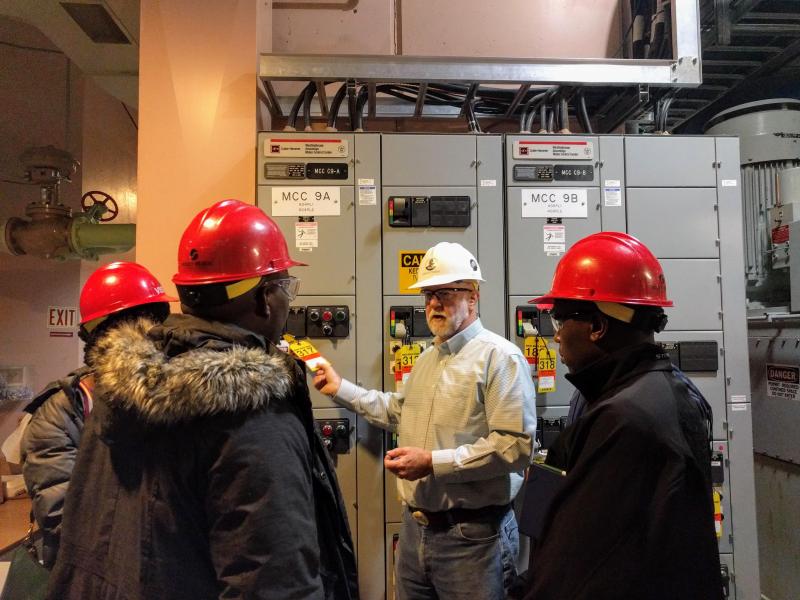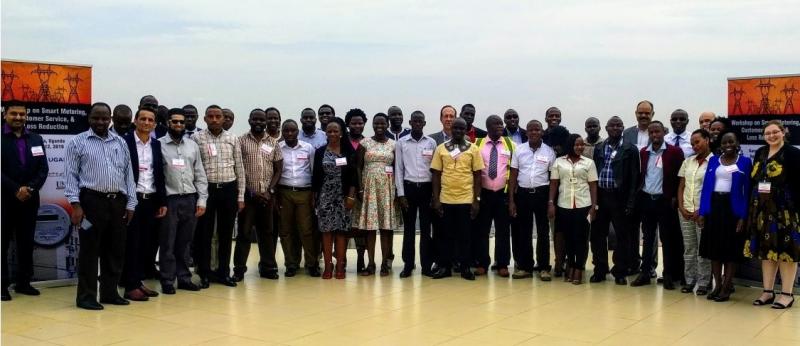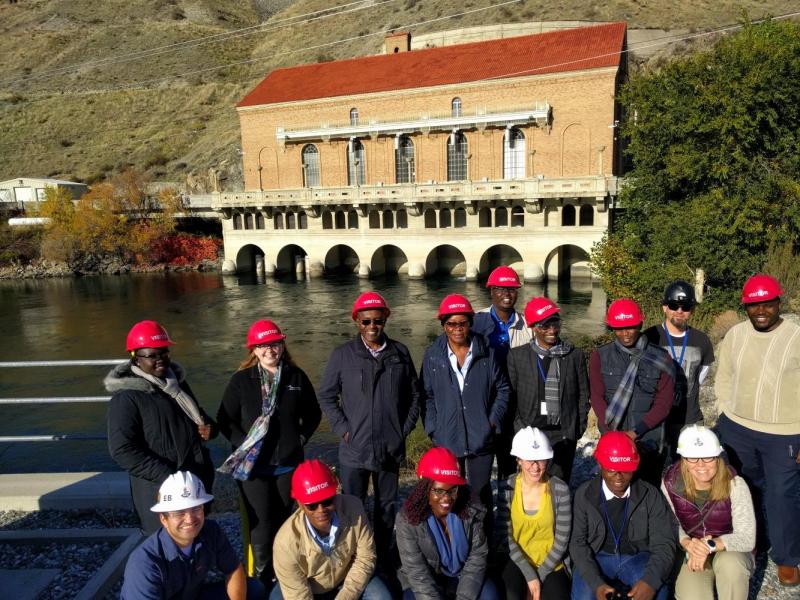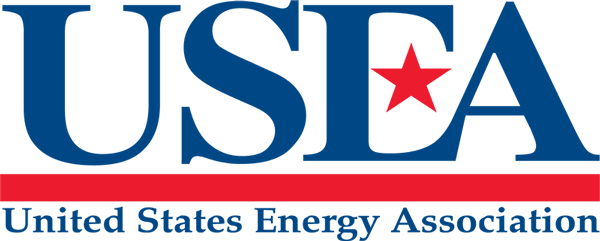Uganda
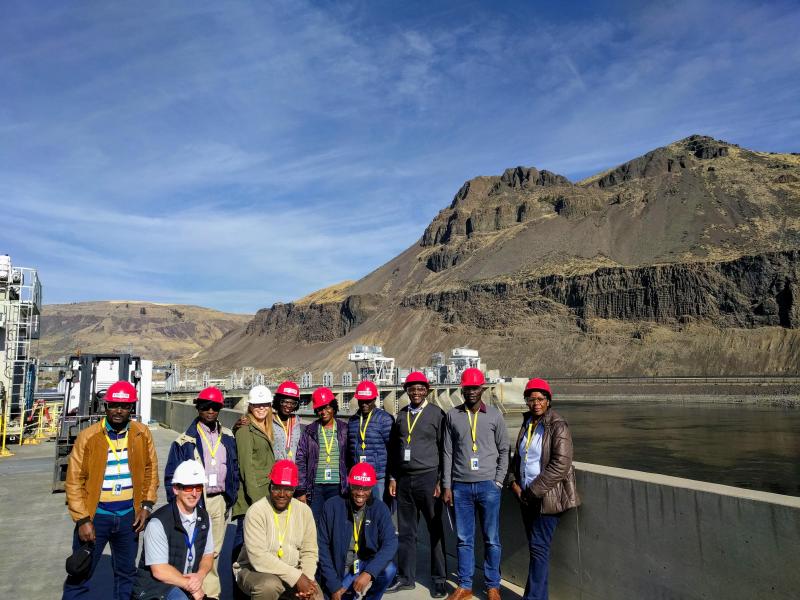
Only 22% of Uganda’s population has access to electricity with nearly 6.9 million households without power. The Government of Uganda has an ambitious goal of achieving 80% electricity access by 2040. EUPP aims to improve the ability for Uganda’s unbundled transmission (UETCL), generation (UEGCL) and distribution (Umeme, UEDCL) companies to increase energy access, ensure best practices in procurement, develop asset management skills, and reduce technical and non-technical losses.
Diversification Strategy Completed
Ugandan stakeholders drafted and approved an Energy Mix Diversification Strategy for the Uganda Electricity Generation Company Ltd (UEGCL). After reviewing the strategy’s findings, the stakeholders agreed to standardize and systematize studies, load forecasts, and national targets to establish consensus through an Integrated Resource Plan (IRP). The plan will help diversify the country's energy mix, leading to a more resilient system.
In-house Maintenance Training to Replace Contractors
After participating in USEA activities, UEGCL is independently training more than 100 Operation and Maintenance Unit and Asset Management Department staff to run hydropower dams. Consultants for operation and maintenance cost $1,500 per day compared to about $54 per day for UEGCL staff. If all 100 UEGCL staff replace consultants, UEGCL will save $52,779,000 annually.
Asset Management Policies Developed
As a result of EUPP capacity building, the Uganda Electricity Generation Company Ltd. (UEGCL) certified 15 employees by the Institute of Asset Management and developed company-wide asset management policies. By using these skills:
- UEGCL has been able to strategically align and prioritize assets. Due to the wide range of small to large hydropower assets in Uganda, it is critical that UEGCL is able to prioritize its asset and make decisions based on information gathered in the practice of asset management. These decisions cascade down to an operational level where preventive maintenance plans, replacement and refurbishment schedules can be made accordingly.
- UEGCL has been able to forecast budgets and resource requirements for the different assets to ensure profitability and financial growth throughout the life cycle of the asset.
- UEGCL has been able to manage the risks involved in asset failures, and therefore, define the level of service across the different assets, including setting up systems to monitor performance to ensure sustainable use of physical resources.
UGANDA GENERATION PARTNERSHIP (2017-Present)
Hydroelectricity provides more than 75% of total generation in Uganda. The Uganda Electricity Generation Company Ltd. (UEGCL) oversees the operation, maintenance, and development these hydropower plants as well as other generation sources within Uganda. Therefore, USEA provided capacity building to UEGCL in order to improve their ability to operate and maintain their hydropower generation assets and be self-reliant.
USEA is working with UEGCL on asset management training and integrated resource planning to ensure reliability and resiliency as UEGCL expands to play a key role in the East Africa region with their large hydropower assets along the Nile River. Moreover, it is critical for UEGCL’s engineers to be trained in the best practices as the Government of Uganda seeks to export surplus electricity from these hydropower assets as part of the Eastern Africa Power Pool.
Additionally, USEA supports UEGCL with expanding their generation mix by working with them in developing an Energy Mix Diversification Strategy to include solar, wind, geothermal and other renewables in order to promote energy security.
To date USEA has aided UEGCL by:
- Improving operation and maintenance, asset management,
- Improving dam safety of hydropower plants; and
- Increasing energy mix diversification of generation assets.
UGANDA TRANSMISSION PARTNERSHIP (2017-Present)
The Uganda Electricity Transmission Company Ltd (UETCL) operates as Uganda's Transmission System Operator and owner of all tranmission lines in Uganda. UETCL has been tasked with rapidly expanding transmission development to reach all 13 service territories and connect to the Eastern Africa Power Pool. However, UETCL has faced various issues in delays, change orders, contract disputes with the contractors they hired to develop High Voltage Transmission projects. Therefore, USEA has worked with UETCL to improve their ability to negotiate contracts, perform due diligence, and implement project management systems.
These workshops aimed at addressing many of these issues by looking at specific contractual language, different dispute resolution methods, and best practices in project management. Going forward, participants recommended to their organizations that they need to enhance community engagement programs, purchase a Project Portfolio Management System software, and increase due diligence on the financial background of bidders.
UGANDA DISTRIBUTION PARTNERSHIP (2017-Present)
USEA worked with the Uganda Electricity Distribution Company Ltd (UEDCL), Umeme Ltd, and other key energy sector stakeholders in Uganda the improve their ability to identify the areas of non-technical and technical losses on the Ugandan distribution system to improve reliability. Umeme and the other distribution service providers serve over 1.2 million consumers and manage around 28,000km of low voltage and 22,000km of medium voltage lines. According to Umeme, the largest distribution concessionary in Uganda, technical losses are decreasing but non-technical losses, such as theft, are still high.
USEA conducted a workshop focused on analyzing the source of losses and the different solutions that can be implemented to reduce losses, such as improved customer billing services, smart grid solutions, and advanced metering technology. The workshop resulted in numerous recommendations on how best to resolve non-technical losses in service territories, improve customer service, and community engagement.
EAST AFRICA GEOTHERMAL PARTNERSHIP (EAGP)
The EAGP, which ran from 2012 to 2018, promoted the development of geothermal energy resources and projects in East Africa. The EAGP program, which was aa partnership between USAID and the Geothermal Energy Association (GEA), encouraged and facilitated the involvement of the U.S. geothermal industry in the region. EAGP focused on six priority countries: Djibouti, Ethiopia, Kenya, Rwanda, Tanzania, and Uganda.
Through EAGP, USEA provided technical and transaction advisory support and capacity building to public organizations and government ministries involved in geothermal development in the region through executive exchanges, workshops and short-term technical assistance assignments to learn about geothermal best practices from their counterparts in the U.S. and third countries.
Facilitated U.S. Business Connections
Through the EAGP-sponsored exchange program to the GEA Expo and GRC Annual Meeting, Ethiopian and Kenyan geothermal officials made contacts with over 70 U.S. firms that supply many of their needed goods and services. EAGP delegates and their senior colleagues in attendance were able to generate new interest in the EA geothermal market among a larger audience of U.S. companies, through presentations on opportunities and procurement needs in EA (organized by EAGP and GEA). The successful event has resulted in a plan to engage U.S. industry members to give feedback on GDC’s, and possibly KenGen’s, tender design. This will improve GDC’s ability to execute transactions related to their goods and services tenders.
Provided Guidance for Development of East African Geothermal Centre of Excellence
Worked with industry experts and advisors to provide feedback and guidance based on the findings of the Icelandic International Development Agency (ICEIDA) Feasibility Study for the East African Geothermal Centre of Excellence and help to design curricula for the Centre
Assisted with Creation of Joint Development Agreement for PPPs
EAGP facilitated a short-term technical assistance program for Kenya’s GDC on producing a joint development agreement for PPPs in geothermal development. EUPP worked with GDC and MoF on the legal structures, financially viable project structures for PPPs and developed a set of recommendations for GDC and produced a market assessment of GDC’s proposed joint development structures.
Assisted in Development of Geothermal Strategies
Provided support to USAID and Power Africa Transactions and Reforms Program (PATRP) in updating and implementing the Power Africa Multi-Donor Geothermal Strategy for East Africa and assisting USAID in developing its own internal Power Africa inter-agency geothermal strategy.
EASTERN AFRICA POWER POOL PARTNERSHIP (EAPP)
Uganda is a member of USEA’s regional Eastern Africa Power Pool (EAPP) Partnership that currently focuses on advanced modeling and long-term planning. USEA will facilitate a series of training programs on load flow modeling and conducting security analyses using PSS/E software platform. These trainings will address insufficient levels of modeling and planning capacity among EAPP planning staff and planning committee members in individual countries. It will also build EAPP’s capacity in the advanced application of the PSS/E software, specifically in advanced power flow, contingency, voltage stability and dynamic analysis, transmission planning, power system operation, and the integration of renewable energy and HVDC systems.
-
"Power Trading in Ancillary Services and Energy Storage in East Africa: A Roadmap" was drafted and submitted to USAID.
EASTERN AFRICA TRANSMISSION PLANNING PROGRAM PARTNERSHIP (EATP)
The EATP (including Ethiopia, Burundi, Kenya, Tanzania, Rwanda, and Uganda) was conducted in 2014 – 2018 to foster regional cooperation in transmission planning and analysis. The EATP developed the capacity of transmission planners in Kenya, Ethiopia and Tanzania to develop regional electric power transmission corridors that will (1) serve as the backbone infrastructure for trade and exchange of electricity, (2) enable investment in new electric power generation plants, (3) support integration of clean energy generation resources, and (4) improve system reliability. The EATP created a Working Group that continued to further refine the national planning models to support regional harmonization and reviewed regional models. The Working Group members include the following organizations: the Eastern African Power Pool, EEP, Kenya Electricity Transmission Company, Ltd., KPLC, TANESCO, Régie de Production et Distribution d'Eau et d'Electricité, Rwanda Energy Group, Ltd., and Uganda Electricity Transmission Company, Ltd. Under EUPP, the EATP developed regional network planning models, beginning with a load flow model for East Africa, progressing to dynamic models over time. The members of the EATP Working Group were trained to prepare each of the models, expanding the pool of qualified network planners in East Africa to continuously fine tune the regional planning model. Topics covered under this partnership included:
- EATP Regional Network Load Flow Models;
- EATP Load Flow and Dynamic Training;
- EATP Load Flow and Dynamic Training;
- Study to Calculate Losses for the EKT Wheeling Transaction; and
- NELSAP/TRACTABEL Study Review.
National Power Balance Settling
The development of a consensus for settling national power balances (import/export) within the regional model for each country. The national power balances will form the basis of the network analysis to be completed using the 2020 load flow model.
Development of a Regional Project Tracker
The initiation of a Project Tracker to determine the probability of commissioning generation and transmission projects within the planning horizon being analyzed (2020).
Adoption of Terms of Reference
EATP countries adopted a Terms of Reference to conduct a sensitivity analysis of regionally significant candidate transmission investment projects using agreed upon parameters.
Self-Assessment Dynamic Modeling and Analysis Tool Developed
The creation of an EATP Self-assessment Dynamic Modeling and Analysis Tool to enable transmission utilities to identify network planning institutional and human resource and capacity deficits and benchmark their capacity against one another.
Creation of Standard Operating Procedures Manual
The creation of a step-by-step Standard Operating Procedures Manual that outlines the planning criteria, defines strict requirements and gives directions and recommendations for construction, usage and update of the EATP regional model in load flow software.
ENGENDERING UTILITIES PARTNERSHIP
Historically, the power sector has been dominated by males - this is particularly true in the developing world. In recognition of and to assist in reducing the barriers caused by the gender gap in the power sector, USEA conducted an Engendering Utilities Partnership in coordination with USAID from 2015 through 2017. The partnership aimed to identify and transfer policies and corporate programs that support increased female participation in the power sector. The partnership was launched with utilities from Georgia, Jordan, Kenya, Macedonia, and Nigeria in order to help the utilities grow and adapt with the community they serve.
The Engendering Utilities Partnership helped these utilities to improve their gender policies and gender achievements by improving labor market achievements, contributing to greater operational efficiencies, increasing profits, enhancing their corporate image, and improving branding opportunities. Through the partnership, EUPP introduced best practices to the member utilities in increasing female recruitment through the introduction of gender-specific hiring techniques, creating an informal mentoring program for women; implementing gender-inclusive policies and procedures; customer service and engagement; and succession planning.
NILE EQUATORIAL LAKES SUBSIDIARY ACTION PROGRAM (NELSAP) PARTNERSHIP
Uganda is a member of the regional Nile Equatorial Lakes Subsidiary Action Program (NELSAP) Partnership. In 2016 and 2017, the NELSAP Partnership focused on capacity building activities for NELSAP member states (Ethiopia, Kenya, Rwanda, Tanzania and Uganda) on the issues of contract and project management. EUPP facilitated several regional workshops for project management specialists, engineers, financial analysist and legal advisors from East African utilities on contract development and negotiations, best practices in procurement, risk management, and dispute resolution. Workshop deliverables included customized project management documents and templates, as well as action plans for regional utilities to improve their contract and project management practices.
In 2019, the NELSAP Partnership’s focus shifted to power trading with the following objectives:
- Creating awareness among regional power industry stakeholders on possible mechanisms for allocation and compensation for ancillary service costs, as well as energy storage alternatives, based on U.S. and other international practices;
- Providing senior regional government officials and utility management with clear understanding of the existing gaps in the current set-up of ancillary services in the East African region;
- Creating a platform for generating sustainable discussions among East African energy stakeholders on policy, regulatory and market barriers for developing both local and regional ancillary and energy storage markets.

